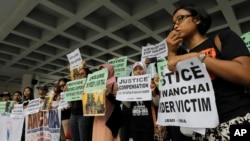After years of local, judicial and international criticism, Hong Kong’s legislature will consider a bill that aims to halt widespread trafficking and abuse of migrant workers and domestic helpers.
A draft of a bill would create a commissioner who would investigate and prosecute cases of slavery and human trafficking. The office also would conduct research and coordinate with international agencies about trafficked workers.
Bill to address migrant worker abuse
The draft is scheduled to be discussed on May 4 at a legislative security panel, whose members debate policy. That would be a preliminary step, and does not ensure that the draft bill will move forward.
“The simple truth is that the current system does not allow for effective protection, investigation, prosecution, relief or reform. The motivation to ignore the problem by the government is admitted: they wish to make HK a hostile place for unwanted migrants,” said attorney Azan Marwah, one author of the draft bill.
Investigations are hampered because responsibility is diffuse, said Marwah, who represented a Pakistani immigrant whose complaints about abuse were acknowledged last year in the city’s High Court. “In Mr. ZN's case, the assaults and non-payment and immigration offenses were all reported to the relevant agencies, but none of them considered them together as a totality. As a result, the case was not taken seriously and no investigations or prosecutions were launched.”
A reluctant city government
One hurdle will be to convince the city’s chief executive, Carrie Lam, that such legislation is needed. All legislation must originate with that office and the city has been reluctant to offer greater rights to migrant workers, who number an estimated 336,000, according to the Justice Centre.
“I think the government made it quite clear it will not think about legislation and it probably only will when they’re told they must by the courts,” said Patricia Ho, a lawyer who helped author the draft. “I think with the encouragement or pressure of the international community that the Hong Kong government is setting up to realize the scale and seriousness " of the problem.
Several local and international organizations have found widespread problems with workers brought into Hong Kong, some who were then moved to other countries. The Hong Kong government says it has plan to explore the problem, but admits it does not include legislation that specifically addresses the forced movement and detention of workers.
“At present, our legislation has provided an adequate and solid legal framework to effectively combat TIP crimes,” Lawrence Li, a spokesman for Hong Kong’s security bureau, wrote in an emailed statement, referring to trafficking in persons. He acknowledged that Hong Kong does not have a single piece of legislation prohibiting the illegal holding or movement of workers.
Marwah sharply disagreed that the government measures are adequate. Hong Kong law does not expressly prohibit slavery, trading in slaves, forced marriage, money laundering related to trafficking, he said.
Pressure is building
Hong Kong’s government has been under pressure in recent years to stop the illegal trade in migrant workers, many of whom work as domestic servants in middle class and wealthy households. In 2016, the city high court found that ZN, the Pakistani migrant who had been beaten and unpaid by his employer, was denied help sought from official agencies, including the police.
The ruling judge found that he had been a victim of human trafficking and that the city’s moves had “failed to achieve even the most basic objectives.”
Last year the U.S. State Department listed Hong Kong in August on a watch list of countries that did not meet UN standards to stop trafficking, such as prosecuting traffickers or identifying victims, inaction was also found in countries such as Afghanistan and Pakistan. The report urged the Chinese territory to pass an anti-trafficking law. The city’s government then rejected the conclusions saying they were unfair and not objective.
A study has detailed abuse
In addition, the Justice Centre, a Hong Kong human rights center, found in a study released in 2016 that many migrant workers in Hong Kong reported that most workers pay thousands of dollars each to secure employment in the city. Once in Hong Kong, they have limited freedom to move and communicate. Many are asked to work excessive hours, suffer physical or sexual violence or threats, and have their mobile phones and travel documents confiscated.
Critics say Hong Kong migrants are tied to their employers because many do not feel free to quit and find new jobs for fear that their visas will be canceled or that they will be unable to repay thousands of dollars to placement agencies.
Researchers found that such migrants worked an average week of 71.4 hours, or nearly 12 hours a day, six days a week. Some workers earned as little as $523 (HK$4,110) a month.
The abuse of domestic workers in Hong Kong became an international story in 2014 when online photos showed a bruised and emaciated Erwiana Sulistyaningsih, a 21-year-old Indonesian woman. She came to Hong Kong to earn money for college. She was forced to work in households where she was unpaid, starved, beaten, deprived of sleep and bathroom breaks.
The widespread use of underpaid domestic workers is one of the more uncomfortable and visible facets of life in Hong Kong. Their visas require that they live with their employers. Each Sunday, tens of thousands of the workers spend their one free weekly day amassing in public parks and plazas.












